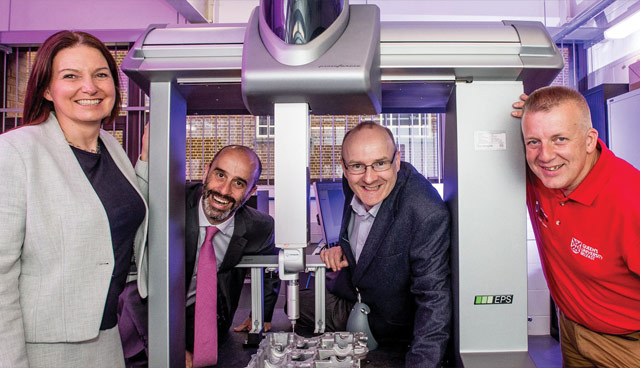Queen’s EPS: The lynchpin in global advanced manufacturing

Professor Mark Price, Pro Vice Chancellor of the Faculty of Engineering and Physical Sciences at Queen’s University Belfast, explains how the university is acting as a key support to the global advanced manufacturing economy.
The foundations of the Northern Ireland economy are built on the manufacturing sector.
From ship building to linen milling, whiskey distilling to rope making, our economic history has been dominated by our ability to turn relatively benign raw materials into quality end products which are sold across the world.
A look around cities like Belfast offer a small insight into the success of many of these industries 100 or more years ago with some of our grandest buildings built on the profits of the manufacturing sector.
Globalisation has meant some of those industries are not as powerful as they once were in Northern Ireland and even recently the manufacturing sector was struggling to compete on a world basis.
However, the inherent ingenuity and drive of companies and people on these shores has meant the manufacturing sector is shining once again, helped in large part by a determination to focus on high end precision products which are inherently more valuable and offer up the chance for higher profit margins.
“The university has been acting as a key pillar in the growth of the sector by providing a flow of highly-skilled talent, top class research and developing international best practice.”
This advanced manufacturing capability has grown considerably over the last few years and is at the heart of the sector’s future.
A plethora of companies are embedded in this quiet revolution, one which has been steadily growing in stature over the last few years.
Our team, at Queen’s University Belfast’s Faculty of Engineering and Physical Sciences (EPS), has been playing our part in no small measure in helping make Northern Ireland advanced manufacturing the envy of the world.
The university has been acting as a key pillar in the growth of the sector by providing a flow of highly-skilled talent, top class research and developing international best practice.
EPS acts as an attractor of students and researchers from across the world. For example, we now have over 750 International students studying here, many of whom take up jobs in Northern Ireland helping our local companies to grow and fuelling our economy. Along with this new post graduate Masters programmes in Mechanical Engineering with Management, and in Data Analytics are providing almost 100 more graduates each year who can start contributing to our vibrant advanced manufacturing and tech sectors.
While students are at the heart of everything we do, the faculty is also a key partner to advanced manufacturers when it comes to research and development. Our ethos is built on partnering and support. Support for new Ideas. Support for people. Supplying talent and technology based on the needs of our partners rather than a more traditional production of graduates.
Confirmation of our commitment can be found in our latest investment.
We have spent £7.5 million in building a state-of-the-art advanced manufacturing technology facility which has the primary aim of supporting our mission to enable a more competitive supply chain by helping increase productivity.

The collaborative investment is one of the biggest in the manufacturing sector and has also been backed by the UK government, partners from Northern Ireland industry, the Department for Business, Energy and Industrial Strategy, Innovate UK and the Aerospace Technology Institute.
Based at the distinguished Northern Ireland Technology Centre (NITC) at Queen’s, it will have an open door to our key industry partners which include RLC Global Point, Moyola Precision Engineering, JW Kane Precision Engineering Ltd, Travan Precision Engineering and Retec Engineering Solutions.
The facility is part of the Centre for Intelligent Autonomous Manufacturing Systems (i-AMS), a pioneer research programme at Queen’s which is leading innovation in new technologies for advanced manufacturing.
Industry 4.0
Through i-AMS, interdisciplinary researchers, spanning the disciplines of Engineering, Computer Science, Applied Mathematics and Psychology, are working together to tackle challenges within industry and helping to make Industry 4.0, the new industrial revolution, a reality.
The advanced manufacturing technology facility will provide key support to our new pioneer research for the programme i-AMS, and both are already making a difference to the advanced manufacturing community in Northern Ireland and the UK.
It is a game changer for the sector and will improve competitiveness and increase productivity, not just for local companies but for the wealth of companies from around the world which we support.
It provides a platform to spin out research into commercial opportunities and engage with industry on cutting-edge ideas on real world projects such as the work with Wrightbus to produce the cleanest hybrid bus technology which powers the London Routemaster.
Spinouts from the university are already punching above their weight with an annual turnover of £215 million and supporting 1,850 high value jobs. The advanced manufacturing technology facility at Queen’s will enable the local industry to be more competitive through the optimisation and digitisation of manufacturing processes, including automation.
“The advanced manufacturing technology facility at Queen’s will enable the local industry to be more competitive through the optimisation and digitisation of manufacturing processes, including automation.”
It also paves the way for more productive, flexible, resilient, responsive and energy efficient manufacturing systems and associated supply chains. This means we can drive down costs, improve product quality, minimise waste and ultimately increase productivity and competitiveness.
Ultimately, the facility allows us to address the challenges which the industry is currently facing and plan ahead to meet future needs. It also provides an opportunity to train up the next generation of experts in manufacturing. From a very early stage, our students at Queen’s will have had the chance to use state-of-the-art industrial machines, which will be beneficial when they begin their careers in industry.
These are just some examples which prove how the intellectual firepower of this faculty is changing the world around us, particularly in the advanced manufacturing sector.
Just as Queen’s University Belfast acted as a pillar of support for those stalwart manufacturers more than 100 years ago, it is now playing a central role in the resurgence of them and their advanced counterparts in the modern age. By partnering with our fantastic indigenous companies along with global industry giants we can lead this quiet revolution and help make Northern Ireland the new Singapore!
Contact details:
Professor Mark Price
Pro Vice Chancellor
Faculty of Engineering and Physical Sciences
T: +44 (0)28 9097 5443
E: pvceps@qub.ac.uk
W: www.qub.ac.uk






